Grand Opening of New Pusat Ehsan Classroom
By: Savannah Jung
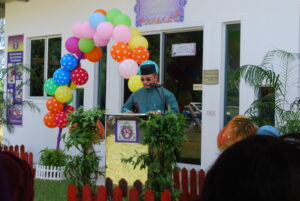
On Monday, February 17th, students, families, volunteers and an excited community joined together to celebrate a special occasion. With balloons floating in the breeze, the sound of music and children laughing, and anticipation in the air, the new Early Years Classroom at Pusat Ehsan Al Ameerah Al Hajjah Maryam, KB was blessed and celebrated. This new addition to the school has been years in the making, beginning with the success of a 2018 fundraiser that made this dream possible.
In October of 2018, Outpost, with the help of business owners and the community as a whole, hosted a Panaga bazaar. Business owners, restaurateurs, and many others donated time, services and products to be sold at the Bazaar. Dr. Ceri Powell, BSP’s Managing Director, offered her home as the location for the Bazaar to take place.
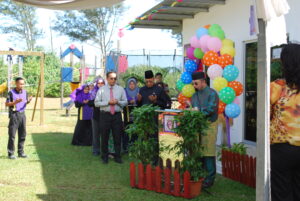
The event was a roaring success with over 200 people participating and a total of nearly $10,000 raised for the school, double the initial target set by the team. Sixteen months later, the new addition is finished, ready to be blessed and shown to the community and volunteers who helped make it a reality. After the blessing, Hamimah Hj Sapar, the branch manager, gave a commemorative speech, thanking volunteers and speaking of all the good that this classroom will provide the students and teachers.
When the school started back in 2009, they had only 11 students and two teachers. Now, over a decade later, they have grown to a class size of 53 students and four teachers. This new classroom extension will be able to accommodate 20 students and includes interactive learning areas where teachers are able to work with students in more personalized and effective ways than before.
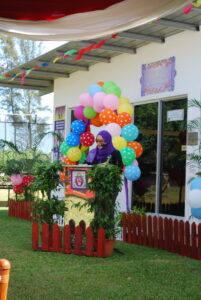
“During the completion of the classroom extension, there were challenges,” Hamimah Hj Sapar said in her commemorative speech. “But that did not stop me. I received a lot of support from the government agencies, individuals, parents and guardians who helped with the completion of the extension.”
This school has been a huge help to the students and their families, offering a safe space for them to grow and learn at their own pace. The story and purpose of this school touched the heart of one expat who eventually went on to volunteer as a teacher until she had to leave for her family’s next assignment. Lee Moore first learned about Pusat Ehsan from an article that she read in POP where Hamimah Hj Sapar was interviewed. Lee is a qualified primary school and special education teacher and saw that her talents were needed at Pusat Ehsan. She began as a volunteer assistant for the Early Years class but soon saw that she could help even more. She became a mentor to the other teachers, created visual resources and conducted professional development for the staff, offering students and two teachers.
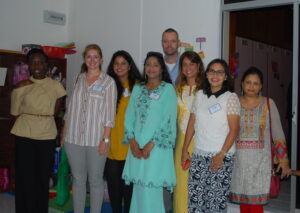
Now, over a decade later, they have grown to a class size of 53 students and four teachers. This new classroom extension will be able to accommodate 20 students and includes interactive learning areas where teachers are able to work with students in more personalized and effective ways than before.
“During the completion of the classroom extension, there were challenges,” Hamimah Hj Sapar said in her commemorative speech. “But that did not stop me. I received a lot of support from the government agencies, individuals, parents and guardians who helped with the completion of the extension.”
This school has been a huge help to the students and their families, offering a safe space for them to grow and learn at their own pace. The story and purpose of this school touched the heart of one expat who eventually went on to volunteer as a teacher until she had to leave for her family’s next assignment. Lee Moore first learned about Pusat Ehsan from an article that she read in POP where Hamimah Hj Sapar was interviewed. Lee is a qualified primary school and special education teacher and saw that her talents were needed at Pusat Ehsan. She began as a volunteer assistant for the Early Years class but soon saw that she could help even more. She became a mentor to the other teachers, created visual resources and conducted professional development for the staff, offering and implementing strategies for the best ways to supportthe students. During her time volunteering at Pusat Ehsan, she made great memories working with Hamimah Hj Sapar and the other teachers.
One of her favorite parts of volunteering was the relationships she developed with the students in the classroom. “(They) are just so sweet,” she recalled.
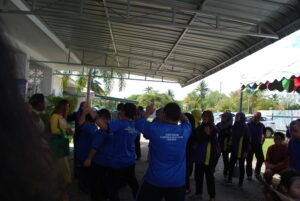
Since the school is a charity, they rely primarily on donations and the volunteers who work there. Monetary donations are welcomed as are educational items and everyday classroom supplies like paper, laminators and stationary. Specific resources are needed for the special education classes like sensory toys, deep pressure vests, fine motor equipment and other supportive resources. If you feel compelled to help through donations or volunteering, you can contact Hamimah Hj Sapar at her office 8670077 or 3347503.
This article can be read in the March/April 2020 edition of POP.
To see all more photos from the event, check out the album on the photos page.